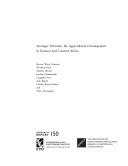| Listing 1 - 4 of 4 |
Sort by
|


ISBN: 0896291588 Year: 2006 Publisher: Washington International food policy research institute
Abstract | Keywords | Export | Availability | Bookmark
 Loading...
Loading...Choose an application
- Reference Manager
- EndNote
- RefWorks (Direct export to RefWorks)
Agricultural development projects --- Agriculture --- Economic aspects
Dissertation

Year: 2019 Publisher: Leuven KU Leuven. Faculty of Bioscience Engineering
Abstract | Keywords | Export | Availability | Bookmark
 Loading...
Loading...Choose an application
- Reference Manager
- EndNote
- RefWorks (Direct export to RefWorks)
Maize is an important staple food and feed crop widely grown in Sub-Saharan Africa (SSA). However, the yield of maize is often below the best yield that can be obtained on-farm with current technology. Specifically in Nigeria, the average yield of maize was 1.8 tons/ha in 2014 compared to the world average of 5.6 tons/ha which indicates a maize yield gap of 3.8 tons/ha. Thus, there is the need for intensification of maize production through the use of innovative approaches to close the maize yield gap in Nigeria and SSA at large. To close the attainable yield gap of the smallholder maize-based farmers' using innovative approaches geared towards increasing their maize productivity and income, improving their food security and addressing the challenge of rural poverty, a Bill and Melinda Gates Foundation (BMGF) supported project known as Taking Maize Agronomy to Scale in Africa (TAMASA) is developing decision support tools for nutrient and crop management amongst other products and services of the project in Nigeria, Ethiopia and Tanzania. One of the decision support tools of particular interest to this doctoral research project is known as Nutrient Expert (NE) decision support tool. The tool is meant for use by extension service providers in generating fertilizer recommendations for specific fields or growing environments of maize-based farmers' which will help increase their maize yield and produce positive welfare benefits. Beyond the geospatial soil and agronomic research inputs in the tool development, a socioeconomic research is necessary to accompany the development, evaluation and dissemination process of the tool. This doctoral research includes an ex-ante and an ex-post components and focuses on both farmers'(ultimate beneficiaries of the tools) and extension agents' (target users of the tools) in order to effectively bridge the knowledge gap necessary for the successful uptake and continuous utilization of NE decision support tools. The ex-ante component seeks to obtain empirical information on preferences and behavioral responses (choice behavior) of farmers' and extension agents' to NE decision support tools through implementing choice experiment for farmers' and extension agents'. The ex-post component aims to empirically establish the potential of the tools in enhancing fertilizer use, yield and income of maize farmers' through implementing a randomized controlled trial.
Book

ISBN: 9780812208610 Year: 2013 Publisher: Philadelphia
Abstract | Keywords | Export | Availability | Bookmark
 Loading...
Loading...Choose an application
- Reference Manager
- EndNote
- RefWorks (Direct export to RefWorks)
Digital

ISBN: 9780812208610 9780812245295 Year: 2013 Publisher: Philadelphia, Pa University of Pennsylvania Press
Abstract | Keywords | Export | Availability | Bookmark
 Loading...
Loading...Choose an application
- Reference Manager
- EndNote
- RefWorks (Direct export to RefWorks)
| Listing 1 - 4 of 4 |
Sort by
|

 Search
Search Feedback
Feedback About UniCat
About UniCat  Help
Help News
News